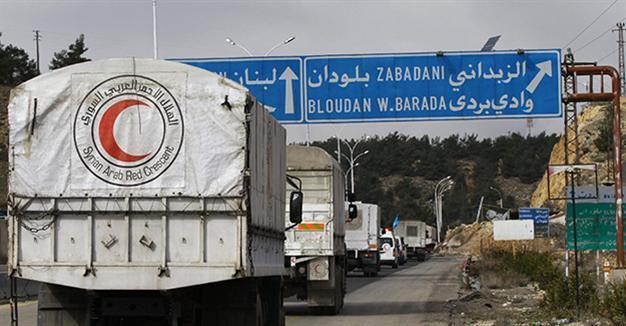New aid convoy heads to besieged Syrian town
DAMASCUS - Agence France-Presse

A convoy of aid from the Syrian Arab Red Crescent heads to the besieged rebel-held Syrian town of Madaya, on January 14, 2016. AFP Photo
A convoy carrying desperately needed food and medicine headed to the hunger-stricken Syrian town of Madaya on Jan. 14, the second delivery of aid this week after months of government siege.
Dozens of trucks carrying flour and other essentials left Damascus early in the morning for Madaya, where the United Nations says suffering is the worst seen in the nearly five-year-old war.
The town's 40,000 residents have endured a crippling siege by pro-government forces that has drawn sharp condemnation from the UN and world powers.
More than two dozen people have reportedly starved to death there since December, sparking a global outcry.
A spokesman for the International Committee of the Red Cross said that a convoy of 44 aid trucks was travelling from Damascus to Madaya.
"The priority is wheat flour and washing materials," Pawel Krzysiek told AFP.
Medical teams were aboard the trucks and "the ICRC is also bringing a nutritionist for a proper assessment" of residents, he said.
A separate convoy of 17 trucks left the capital for Fuaa and Kafraya, two towns in Syria's northwest encircled by rebels, and the aid will enter all three places simultaneously, Krzysiek added.
It follows a delivery on Jan. 11 that was the first humanitarian assistance received by Madaya in nearly four months.
The UN's Office for the Coordination of Humanitarian Affairs said a third delivery to the towns would take place "in the following days."
Large, white aid trucks emblazoned with the red logo of the Syrian Arab Red Crescent were lined up in the sun along a paved road in the hilly outskirts of Damascus, an AFP photographer said.
The convoy was led by smaller vehicles bearing the blue flags of the UN's refugee agency.
"We are encouraged that we have been able to reach these towns, where thousands of people have been trapped for very long periods of time," the UN's humanitarian coordinator for Syria, Yacoub El Hillo, told reporters.
El Hillo acknowledged that the deliveries into Fuaa and Kafraya could be delayed because of complex security measures in the area, but said he hoped operations would continue.
"We do not want to see this as a one-off," he said. "Ultimately the real solution to this predicament, to the plight of the people besieged in these towns, is for the siege to be lifted."
He said the World Health Organization was in "direct talks" with Syrian authorities to secure the evacuation of Madaya residents in need of urgent medical care.
"We found very urgent cases in Madaya that need to be quickly transferred to hospitals for treatment. We hope that this will happen in the coming days," El Hillo said.
So far, one eight-year-old girl in need of specialised care had been transferred out of Madaya along with her parents and was receiving treatment in Damascus, he added.
The UN has called for nearly 400 residents of the town who need immediate medical care to be evacuated.
UN envoy Staffan de Mistura said Wednesday that world powers would push for "immediate action" to deliver aid to besieged areas in Syria, after talks in Geneva with ambassadors from the Security Council's permanent members: Britain, China, France, Russia and the United States.
Madaya, the nearby opposition-held town of Zabadani, as well as Fuaa and Kafraya, are part of a landmark UN-brokered truce deal between rebels and regime fighters reached in September.
The Syrian government and the United Nations have championed similar localised ceasefire deals as a way to end fighting across Syria, where more than 260,000 people have been killed since 2011.
A new round of Syrian peace talks is planned for January 25 in Geneva, but there are fears that a diplomatic row between Iran and Saudi Arabia, who back opposing sides in the war, could derail the process.
US Secretary of State John Kerry was expected to try to shore up the fragile peace process in talks with Saudi Foreign Minister Adel al-Jubeir in London on Thursday.
